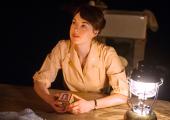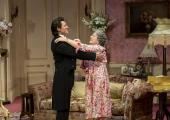BBC Singers, Endymion, Hill, Milton Court
A Steve Reich masterpiece at the end of an American rainbow in epic choral programme
Milton Court’s new concert hall is a mighty small space, but the BBC Singers under their chief conductor David Hill were determined to launch their residency there with a musical epic of world events from Genesis to the post-nuclear era. And they carried it off triumphantly, if with some ear-singeing resonances, in American works from the last 66 years ringing with bright tonalities. The real surprise was to find Nevadan choral guru Eric Whitacre reaching for the stars as confidently, if not as consistently, as Steve Reich in his 1984 masterpiece The Desert Music.









